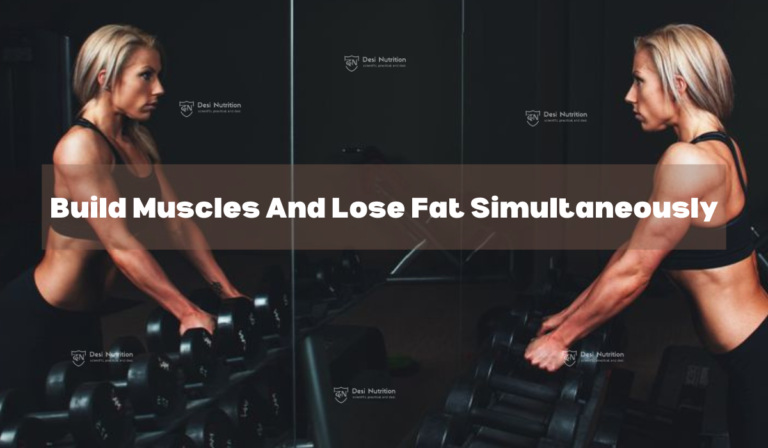Building muscle and losing fat could go hand-in-hand. You don’t believe it? Then this is the right place for you to explore how to build muscle and lose weight simultaneously.
Building muscle and losing weight seems like two different and contradicting thoughts but what if we tell you you can do both simultaneously? This is also known as “body recomposition”. This could sound challenging to some people but with the right approach, there is no such health goal(s) you cannot achieve.
Understanding body recomposition
Body recomposition involves two processes at the same time, one is muscle gain and the other is losing fat. In typical situations, these two health goals are pursued separately but that doesn’t mean you can build muscle and lose fat simultaneously.

They both are different goals hence, people have different approaches to achieving these goals. Muscle gain is about focusing on muscle growth and target which involves caloric surplus. On the other hand, losing fat requires you to create a caloric deficit. So how would you approach these health goals at the same time? All you need is a carefully planned approach and you can witness effective results.
The science behind body recomposition

Once you will understand body recomposition you will get to know that the idea of muscle gain and fat loss can occur concurrently under specific conditions. You would have to make some changes in your lifestyle to achieve two contrasting health goals at the same time.
Muscle protein synthesis vs. muscle protein breakdown:
Muscle gain is the result of muscle protein synthesis exceeding muscle protein breakdown. Resistance training can help to stimulate MPS resulting in muscle growth. Support this process along with losing body fat by consuming the right nutrients and training stimulus.
Energy balance and macronutrient and manipulation:
Fat loss requires a calorie deficit and muscle gain needs a caloric surplus. You need to carefully manage your macronutrient intake by including protein, carbs, and fat. Protein is not only crucial for weight loss but is an essential micronutrient in muscle building. Time your meals and ensure you are eating 4-5 meals per day and also time your meals around your workouts.
Hormonal influence:
Hormones like cortisol, testosterone, insulin, and growth hormone play a significant role in body recomposition. Resistance training and proper nutrition can optimize these hormones to promote muscle gain and fat loss simultaneously.
Strategies to build muscles and fat loss
Working on both muscle gain and losing body fat at the same time could be a bit challenging but with the right approach and strategies you can effectively achieve body recomposition. Here are some of the strategies to use for achieving body recomposition:
Prioritize resistance training:

You need to prioritize resistance training for effective results. In order to build muscles you need resistance training exercises like weight lifting, bodyweight exercises, or using resistance bands. You will gain muscle through resistance training which also promotes fat loss.
-
Progressive overload:
Try to progressively challenge your muscles when you are on the journey of losing weight. Increase the weight, sets, and reps or intensity of your workout with time. This will help you to progressively challenge your muscles and support the growth and strength of muscles.
2. Compound movements:
Compound movements will also help you to gain muscles by simultaneously engaging different muscle groups. Include squats, deadlifts, bench presses, and rows in your strength training regime for effective results to achieve body composition.
3. Frequency and volume:
You need to keep track of the frequency, volume, and intensity of your workout for both strength training and cardio. Include strength training sessions in your routine at least 3-4 times a week. You need to ensure an adequate frequency of your workouts sessions because your body needs proper recovery time.
Incorporating cardio:

Cardio is essential to burn calories effectively. Ensure to incorporate cardio wisely in your exercise regime to achieve body recomposition. You need to integrate cardio in such a way that it can support fat loss without compromising muscle mass.
-
Moderate intensity cardio:
Moderate-intensity cardio such as brisk walking, cycling, or swimming can help you burn calories and not hinder your muscle gain process. A total of 150 minutes of moderate intensity cardio per week can help you get nearer to your goal, requiring you spread this 150 minutes wisely throughout the whole week.
-
High-intensity interval training (HIIT):
One of the most effective strategies to gain muscle along with cardio is to include HIIT in your routine. HIIT involves short bursts of intense activity followed by periods of rest. One incorporates HIIT in their routine because they are time-efficient and can enhance metabolic rate.
-
Cardio Timing:
Timing of cardio sessions is also important or else it might interfere with your muscle growth process. Integrate cardio sessions into your routine either on separate days of your resistance training or after your strength training session. Do not compromise your rest days of muscle recovery.
Prioritize and optimize nutrition

Nutrition is the key to achieving your health goals, specific or otherwise. You need to balance macronutrients and your meal timings to optimize nutrition in your daily routine.
-
Protein intake:
Protein is crucial for both muscle gain and fat loss. People often think protein is only for muscle gain, but it also helps to promote weight loss and management. Include protein in your diet efficiently by including a protein source in every meal and snack to maintain a positive nitrogen balance which is necessary for muscle growth.
-
Complex carbohydrates:
Carbohydrates are essential for your body because they are the primary source of energy. It fuels you throughout your workout and aids in recovery. Esure to consume complex carbs mostly around your workouts so not only it provides you with energy but also replenishes your glycogen stores. You will get energy for your whole day including your workouts and also minimize the fat storage.
-
Healthy fats:
You need to focus on healthy fats during your body recomposition. Fats are essential for hormone production including testosterone. These hormones play a crucial role in muscle growth. Include healthy fat sources in your meals like avocados, nuts, seeds and olive oil. Ensure to keep your fat consumption moderate to avoid high-calorie intake.
-
Caloric intake:
To lose weight during muscle gain you need to create just a slight calorie deficit. The deficit should not be significant or it would hinder the muscle growth process. Track your progress and adjust your caloric intake accordingly.
-
Meal timing:
Instead of eating large meals 3 times a day, focus on consuming frequent meals ate regular intervals to control calorie consumption. Eating frequent meals will help you feel full and ensure stable energy levels throughout the day. Establish a meal plan which includes meals around your workout sessions.
Supportive supplements:

In your diet you need to include supportive supplements that can help you meet the nutrient requirements of your body, Include supplements like whey protein, creatine, and BCAAs (Branched-Chain Amino acids). You also need to add multivitamins and omega-3 fatty acids to your diet. Consuming supplements can also be useful to meet your nutrient needs.
Rest, recovery, and sleep

Rest, recovery, and sleep are all interlinked. You have to prioritize the three not just to get effective results but also because your body needs them. Ensure to have adequate rest by sleeping so you can recover quickly.
-
Prioritize sleep:
Sleep should be your priority if you want to improve your health. Aim to get 7-9 hours of sleep per night in one go. You need to allow your body to rest after workout and sleep is the only time when the body heals itself. The repairing, production of growth hormones, and regulation of appetite-controlling hormones are all controlled by quality sleep. Get a good quality of sleep to promote rest and recovery of your muscles.
-
Manage stress:
Chronic stress is the major contributor to weight gain. The increased levels of cortisol, the stress hormone, can increase the production of ghrelin, the hunger hormone which will lead to more calorie consumption. The increase in cortisol would also lead to muscle breakdown and fat retention. During your body recomposition journey, you need to practice stress management techniques to keep cortisol and ghrelin in control.
-
Active recovery:
Include walking, stretching, or yoga in your workout routine as active recovery activities. They will help you recover on your rest days. Such activities are helpful for you because they reduce muscle stiffness, improve blood circulation, and promote relaxation.
Track your progress
You have to track your progress to ensure you are going on the right track. Tracking will help you in numerous ways like:
Body measurements:
You can track your progress by using body measurements like tape measure to track changes in your waist, hips, chest, arms, and thighs. You can get a clearer picture of fat loss and muscle gain.
Photos:
Take photos and note your strength improvements in the gym. Muscle gain is visible and photos can help you see increased strength and muscle definition.
Adjusting your plan:
You might need to make some adjustments that will cater to your health goals. Ensure you track your progress and see if you need to make some changes in your dietary approach or exercise routine. Consult an excerpt nutritionist or a trainer to help you create a meal plan and exercise plan, respectively, tailored to your specific needs.
Frequently Asked Questions
Is it possible to gain muscle and lose fat at the same time?
Ans. Yes, it is possible to gain muscle and lose fat at the same time. All you have to do is have a strategic approach because both these goals have different requirements. Muscle gains require you to create a calorie surplus whereas losing fat requires you to create a calorie deficit.
Does muscle building burn fat?
Ans. Yes, muscle-building burns fat. Strength training helps to boost metabolism which helps to burn calories which is the fundamental aspect of losing body fat.
Should I gain muscle or lose fat first?
Ans. If you are looking to pursue both the goals separately, then you should opt for losing body fat first. The amount of body fat you want to lose first also depends on your current weight. With time you can incorporate strength training in your routine which will help you to build muscle. Strength training also promotes metabolism which will help to burn more calories even at rest. Therefore, you need to create a workout plan where losing fat and gaining muscle can go hand in hand.




